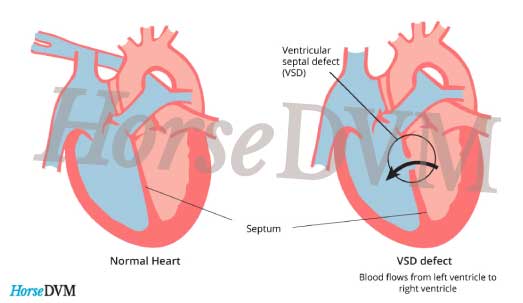Ventricular septal defects (VSDs) are the most common congenital heart defects in horses. VSDs occur in 0.1 to 0.5% of equine populations. The Arabian horses or Arabian cross breeds are thought to have a genetic predisposition for VSDs, as they occur very frequently in this breed.
VSDs allow blood to shunt inappropriately from the horse's left ventricle to the right ventricle through an opening in the ventricular septum. As blood recirculates through the left chambers and lungs, it causes enlargement of the heart muscles, altered pressures within the heart, and in severe cases, systemic abnormalities such as cyanosis. Clinical signs of VSDs in horses vary widely depending on the severity of the defect and the age of onset. Horses with mild defects are often asymptomatic or don't develop clinical signs until they are older.
Latest Research
The University of California-Davis is currently conducting a clinical trial on Arabian horses and Arabian crosses with VSDs. They are investigating the possibility of a genetic predisposition for VSD in these breeds. Eligible horses include any Arabian or Arabian cross horse breeds that have a right-sided systolic heart murmur, or a veterinary diagnosis of VSD.
Click here for additional information about the research and clinical trial.